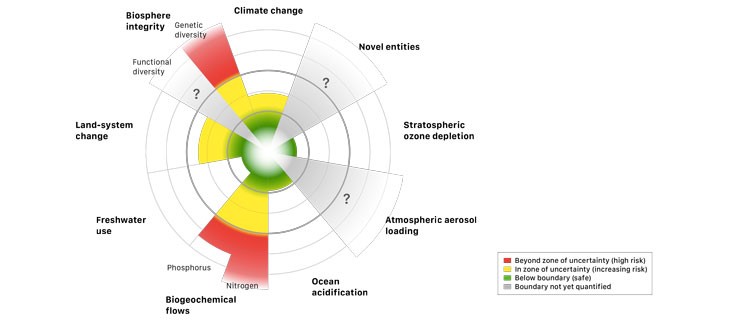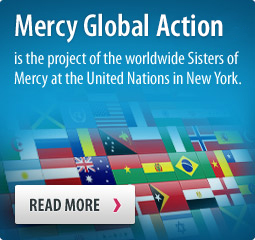
'Caring for our Global Village: Report on Talk by Peadar Kirby, Professor Emeritus of University College Cork
Reports: February 11, 2018
On Saturday 3rd February, Denise Boyle fmdm attended the annual justice event known as ‘Feile Bride’ Bride’ organised by AFRI, St. Patrick Mission Society (Kiltegan Priests) and the Brigidine Sisters, to mark the feast of St. Brigid as one of the patron saints of Ireland. The keynote address was delivered by Professor Peadar Kirby, an academic and activist of international renown.
In a stimulating and passionate address, Peadar shared his concerns about Earth. He began his talk by posing the question: ‘Are we caring for our Planet?’ Pre-empting a response he shared that a look at statistics gleaned from the ‘Ecological Footprint’ of different countries provided a disturbing answer:
- In 1961 all countries combined were using 74% of the planet’s resources.
- In 1991 this had risen to 114% of earth’s resources
- In 2017 the use of resources equalled 164%!
Turning to individual countries the statistics are both sobering and alarming. Compiling the data from areas that include carbon emissions, use of forest and agricultural land, plus energy and water use scientists worked out that:
The United Arab Emirates needs 5.4 Earths.
France needs 2.5
The United States needs 4.5 Earths.
NB. Peadar suggested that each of us take the ‘personal ecological footprint’ test to ensure we each become aware of how we are treading on the Earth’s surface. See: www.footprint.wwf.org.uk
He then introduced the topic of ‘Planetary Boundaries’, a concept of nine Earth system processes devised in 2009 by 28 environmental and Earth system scientists, led by Johan Rockström from Sweden and Will Steffen from Australia. Their concept is based on scientific evidence that human actions since the Industrial Revolution are the principal driver of global environmental change. The set of nine planetary boundaries are defined as a ‘safe operating space for humanity’ within which all peoples can continue to develop and thrive for generations. Not crossing these boundaries is a precondition for sustainable development.
This diagram estimates how the different control variables for seven planetary boundaries, which are measureable, have changed from 1950 to the present. The green shaded polygon represents human activities that are within safe margins; the yellow indicate those that may or may not have exceeded safe margins, whilst the red areas represent human activities that have exceeded safe margins! And the grey areas with question marks, represent activities for which safe margins have not yet been determined. Source: Steffen et al. 2015.

Of the three red areas where human activities have led to exceeding the boundary, bio-diversity is the most serious, followed by the poisoning of soils with nitrogen from artificial fertilizers. Additionally pouring tar macadam over fertile agricultural land has serious consequences for food sustainability. All of the above according to Peadar Kirby means: ‘Our activities are not getting us to where we need to go!’ He quoted extensively from Pope Francis’ ground breaking encyclical ‘Laudato Si – On Care For Our Common Home’, in the context of its urgency and the Pope’s courage as the only world leader who has clearly stated the root cause of the exploitation of our fragile Earth.
L.S. 56 ‘... economic powers continue to justify the current global system where priority tends to be given to speculation and the pursuit of financial gain, which fail to take the context into account, let alone the effects on human dignity and the natural environment. Here we see how environmental deterioration and human and ethical degradation are closely linked.'
In paragraph 139 Pope Francis according to Peadar, succinctly states the problem:
‘...We are faced not with two separate crises, one environmental and the other social, but rather with one complex crisis which is both social and environmental. Strategies for a solution demand an integrated approach to combating poverty, restoring dignity to the excluded, and at the same time protecting nature.’
Drawing on the wisdom in Laudato Si', plus the positive energy and goodwill following the signing of the Paris Climate Agreement in December 2015 by 195 world leaders, Peadar with his colleague Tadhg O’Mahoney wrote a book just published this year. It is called ‘The Political Economy of the Low-Carbon Transition - Pathways Beyond Techno-Optimism’, which addresses the global need to transition to a low-carbon society and economy by 2050. Highlighting the techno-optimism that informs our current understanding and policy options, the authors draw on the lessons of international development to situate the transition to low carbon, within a political economy framework.
Kirby and O’Mahoney do this by critically examining the range of pathways being implemented by developed and developing countries, which they collectively identify as climate capitalism, a version of neo-liberalism, led by technology. As we are all increasingly aware of, this approach will not lead us to a low-carbon and sustainable society. Instead we need an alternative approach that the authors believe is emerging from community initiatives – bottom up - plus discussions on post capitalism and debates about wellbeing and limiting growth. The term they use for placing society and environment at the core of development is ‘ecosocialism’ – a concept they caution that has to be considered within the conditions being created by Trumpism and Brexit.
In concluding his excellent presentation, Peadar stated his strong belief that the future of our Planet and human survival depends on the ‘bottom up’ approach. This is where real change will come from and is happening!
Messages to: Denise Boyle fmdm - Team Leader Mercy Global Action




